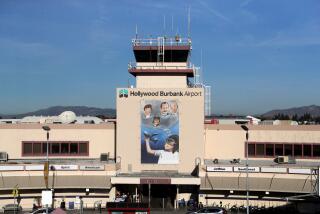Do Most Really Oppose Burbank Airport? : Comparing results of recent election and an opinion poll, ‘the people’ and ‘the voters’ seem to be sending different messages.
- Share via
The city of Burbank has been waging a cold war with the Burbank Airport ever since the seating of two new members of the City Council this month. But are the people behind the crusade against the three-city airport? Maybe not.
The Burbank-Glendale-Pasadena Airport Authority wants to replace the shabby terminal with a bigger one having 19 passenger gates, five more than now. Opposing it are people who see the airport mainly as a source of aircraft noise. They want no more flights and--despite airport officials’ weary insistence to the contrary--believe holding down the number of gates will keep the airport’s business from growing.
This spring’s municipal election shifted control on the City Council to the anti-expansion side. Since any of the three cities that own the airport can block any major spending plans, plans have come to a halt. The dispute could take months to resolve.
The election seemed to say the people hate the airport, but a public opinion poll last fall said exactly the opposite. We thus have the familiar paradox in which “the people” and “the voters” are sending quite different messages.
Some airport critics have dismissed the poll as flawed. But it was done by a respected professional, Arnold Steinberg of Calabasas, and appears to have been rigorously neutral. The sample was a comfortable 800 randomly selected past voters, and the questions were worded so as not to influence answers.
The survey looked throughout like very good news for the airport--virtually a valentine from a grateful citizen body.
Sixty-four percent of those queried said the airport should have the new, larger terminal building it wants. The Airport Authority got a higher approval rating than the Burbank school board and twice that of the City Council. It got a higher rating than any locally elected member of Congress or the California Legislature.
Sixty-two percent of those responding said additional commercial development was good for the city, and four-fifths of them associated more activity at the airport with more business in Burbank.
Moreover, and here is the interesting part, nearly half the terminal supporters reported feeling “strongly” about their support. Self-identified strong supporters outnumbered strong opponents nearly 2 to 1.
At election time, the story couldn’t have been more different. Instead of sending valentines, the citizens looked like a torchlight parade of villagers marching up the hill to Frankenstein’s castle. What happened?
It’s true that the ballot lacked an outspoken defender of the airport. All 10 candidates were critics to varying degrees, so the vote could have hinged on other factors.
Still, three moderates who would have allowed the terminal plans to get under way finished among the also-rans. The top vote-getters were uncompromising foes of a new and bigger terminal. One was elected outright; two others reached a runoff.
A turnout of only 18% of those registered was probably a factor. Low voter turnout is a famous recipe for success by single-issue voters.
Another factor, it seems clear, is that the real intensity of feelings belonged to the anti-noise side. And this points up a central problem with polling. Although sophisticated in many respects, it is crude at measuring the conviction and intensity with which opinions are held.
The pollsters apparently suspected that people’s knowledge of the terminal issue was skimpy. They led up to the question on the expansion plan with a 59-word description of it. It’s possible to imagine many people wondering how to answer and forgetting about the issue as soon as they did.
As pollsters often do, Steinberg asked people how strongly they felt. But how reliable, how comparable, are such answers? Does one person’s “strongly” equal another’s? Surely not.
The problem is well-known. Three decades ago V. O. Key Jr. devoted a chapter to it in his book “Public Opinion and American Democracy.” John Allen Paulos touches on it in his recent “A Mathematician Reads the Newspaper.” He favors “a weighted poll in which each vote is multiplied by a numerical measure of the voter’s intensity,” but then he confesses he does not know how to measure intensity.
One simple, objective test of how strongly people really feel about something is whether they bestir themselves to do anything about it. By that measure, all the intensity lay with the airport’s enemies.
If there really is wide but silent approval for a vigorous, growing airport, it conceivably could be awakened to action by the perception of a real threat to the institution. People who support the institution would do well to make their views known to the appropriate officials as events unfold.
But don’t hold your breath. On this issue, we seem to be fated to hear nothing but noise about noise.
More to Read
Sign up for Essential California
The most important California stories and recommendations in your inbox every morning.
You may occasionally receive promotional content from the Los Angeles Times.













